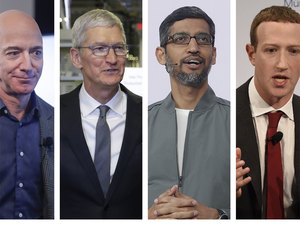
WASHINGTON: Four Big Tech CEOs, Facebook's Mark Zuckerberg, Amazon's Jeff Bezos, Sundar Pichai of Google and Tim Cook of Apple, are set to answer for their companies' practices before Congress as a House panel caps its yearlong investigation of market dominance in the industry.
The powerful executives are set to defend their companies as buttressing competition and offering essential services to consumers. The four CEOs are testifying remotely for a hearing Wednesday by the House Judiciary subcommittee on antitrust.
President Donald Trump, meanwhile, continued to denounce the big tech companies, which he has accused, without evidence, of bias against him and conservatives in general. In a tweet, he challenged Congress to crack down on the companies.``If Congress doesn't bring fairness to Big Tech, which they should have done years ago, I will do it myself with Executive Orders,`` Trump tweeted before the start of the hearing. ``In Washington, it has been ALL TALK and NO ACTION for years, and the people of our Country are sick and tired of it!``
Trump's Justice Department has urged Congress to roll back long-held legal protections for online platforms such as Facebook, Google and Twitter. The proposed changes would strip some of the bedrock protections that have generally shielded the companies from legal responsibility for what people post on their platforms.
The four tech CEOs command corporations with gold-plated brands, millions or even billions of customers, and a combined value greater than the entire German economy. One of them, Bezos, is the world's richest individual; Zuckerberg is the fourth-ranked billionaire.
Critics question whether the companies stifle competition and innovation, raise prices for consumers and pose a danger to society.
In its bipartisan investigation, the Judiciary subcommittee collected testimony from mid-level executives of the four firms, competitors and legal experts, and pored over more than a million internal documents from the companies. A key question: whether existing competition policies and century-old antitrust laws are adequate for overseeing the tech giants, or if new legislation and enforcement funding is needed.
Subcommittee chairman Rep. David Cicilline, a Rhode Island Democrat, has called the four companies monopolies, although he says breaking them up should be a last resort. While forced breakups may appear unlikely, the wide scrutiny of Big Tech points toward possible new restrictions on its power.
``Simply put, they have too much power,'' Cicilline said in opening remarks Wednesday, as he laid out data pointing up the power of the four tech companies as essential cogs of commerce and communications.
He also said that in the wake of the coronavirus pandemic, ``these giants stand to profit'' and become even more powerful as millions shift more of their work and commerce online.
The companies face legal and political offensives on multiplying fronts, from Congress, the Trump administration, federal and state regulators and European watchdogs. The Justice Department and the Federal Trade Commission have been investigating the four companies' practices.
Each company has a distinct profile and each tech titan has his own approach and story to tell.
For Bezos, who presides over an e-commerce empire and ventures in cloud computing, personal ``smart'' tech and beyond, it will be his first-ever appearance before Congress.
Bezos is introducing himself, in a way, in his hearing testimony, unusual for the occasion. He lays out his challenging life story growing up in New Mexico as the son of a single mother in high school, and later with an adoptive father who emigrated from Cuba at 16. Previewing his written testimony in a blog post Tuesday, Bezos traces his origins as a ``garage inventor'' who came up with the concept of an online bookstore in 1994.
He addresses the issue of Amazon's power in what he describes as a huge and competitive global retail market. The company accounts for less than 4% of retail in the U.S., Bezos maintains. ..
No comments:
Post a Comment